Welcome to New Player’s Guide, the first stop on your journey to playing D&D. This series has advice for players who’ve just joined their first D&D campaign, as well as Dungeon Masters who want help taking their new campaign to the next level. To see the other articles in this series, check out the New Player’s Guide tag—and for the brass-tacks information on how to start playing D&D, click on the New Player Guide link at the top of this page!
The fourth entry in the New Player’s Guide is all about how to ensure that your group that games together stays together. Here, Dungeon Masters will learn how to set ground rules and dispel bad assumptions and players can discover how to become the best D&D player possible.
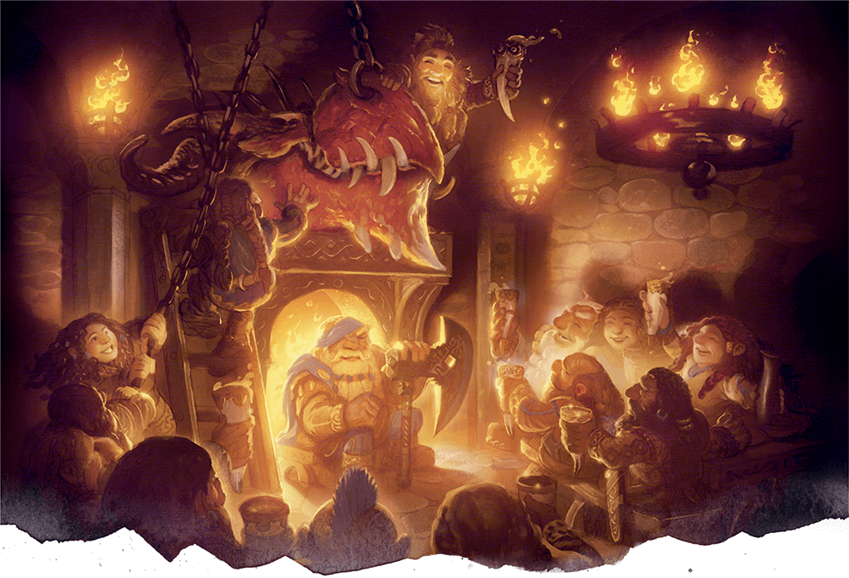
For Dungeon Masters: Laying Ground Rules
As a Dungeon Master, you already have a lot on your plate. Running a campaign means making a lot of meticulous notes on your game world, and sometimes also taking notes based on the adventure you’re running, too! Laying out ground rules to ensure your players’ good behavior may seem awkward, especially if your players are long-time friends of yours, but it’s always better to be a little awkward now than to suffer the consequences later.
The best time to lay down the law of the land is during a Session Zero. What’s that? Well…
Start with Session Zero
“Session Zero” is a pre-game meeting typically initiated by the group’s Dungeon Master in which the group talks about what they want out of the game. Since your group probably hasn’t played RPGs before, you probably won’t know exactly what you want, but it can help to have a few ideas. By the same token, you should also come prepared with things you don’t want included in your game. If you feel comfortable talking about things that are psychologically triggering or even just unpleasant for you, now is the time to make sure that everyone agrees those things won’t be included in the game. At all.
You’re the DM, so while you have final say over what you put into your D&D game, you owe it to your players to consider their needs too. Present to them what you want out of the game, and be prepared to negotiate. If a player is seriously arachnophobic and they tell you that even thinking about fighting a giant spider would put a dent in their evening, don’t force the issue. If player really wants there to be dragon-riding, see if everyone else wants that too, and think of a way to work it in. Saying “sure, but you’ll need to be high level to do that” is a totally valid answer.
Session Zero can be as long or short as it needs to be. Some Session Zeroes can take the entire first game, while others only take about ten minutes and then everyone can happily jump into playing. Some games only have one Session Zero at the beginning, while others have quick “Session Zero Plus” check-ins every few games. Likewise, if your players are building their characters together, your first-ever Session Zero is a great place to do that.
Here's a dedicated article if you want to know more about how to run a Session Zero. On top of working out the content of your campaign, Session Zero is the perfect time to make sure everyone in your group is on the same page going into your campaign. The first step in doing that is setting expectations—or put another way…
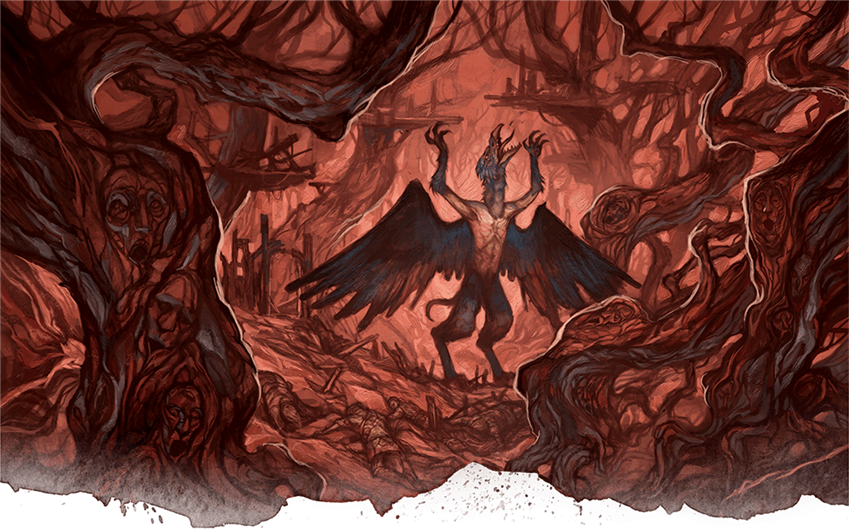
Clearing Out Bad Assumptions
As your group’s DM, you are your gaming group’s de facto leader. Since you took initiative to start the group, most players will assume you’ll take initiative to do all the other stuff, too. That’s everything from planning sessions to hosting the game to buying the snacks—and so on. And in a way, this makes sense. If a player can’t make a session, the show can go on, but if the DM can’t make it to the game… then there’s no game night. However, you don’t have to be the group leader if you don’t want to be. There might be someone in your gaming group who loves scheduling (such people do exist!) and someone else might have a much better house for hosting your game night than yours. Perhaps most importantly, the entire group should work together to bring snacks, either by pooling money or by potlucking it.
Of course, while assuming that the DM will organize, host, and cater game night are three of the most common unchallenged expectations for D&D groups, they’re not the only ones. Here are some other typical assumptions that, if not addressed, could sap your fun or even split your group. Think about your preference for each one and talk with your players about each at your Session Zero. Communicating these unspoken assumptions is a straightforward way to aligning your group’s expectations.
- How long should D&D sessions be? Most are about 3 to 5 hours long. Is that too long, or too short?
- Do you want to play a campaign? How long do you want that campaign to be? Are there any foreseeable real-life events that will temporarily or permanently remove a player?
- Are guests allowed at the gaming table? Does it have to be someone everyone knows? Do people have to unanimously agree to invite a guest?
- Is alcohol allowed at the session? Likewise, are players allowed to smoke or vape? If so, can they only do so outside, or is doing so at the table okay?
- Do players have any allergies or dietary restrictions?
- How well do the players need to know the rules? How well does the DM need to know the rules? Some DMs are happy to know the rules backwards and forwards so that the players just have to say they want to do something and the DM can respond “make this kind of check.” Other DMs don’t even look at their players’ class abilities and trust the players to know their character inside and out.
- What’s the tone for your campaign? Rather than just saying “comedic” or “dramatic,” try comparing it to a movie, book, or video game. Including a film or video game-style rating like “PG-13” or “M” helps start the discussion. “Lord of the Rings but it’s rated R so Aragorn can drop the F-bomb” is a classic D&D genre.
- Is romance between player characters allowed in the game? Between a player character and an NPC? Does the answer change if the players are dating in real life?
It’s worth coming back to these questions every few months, if you’re still playing. Have your answers changed? Have you come up with new questions?
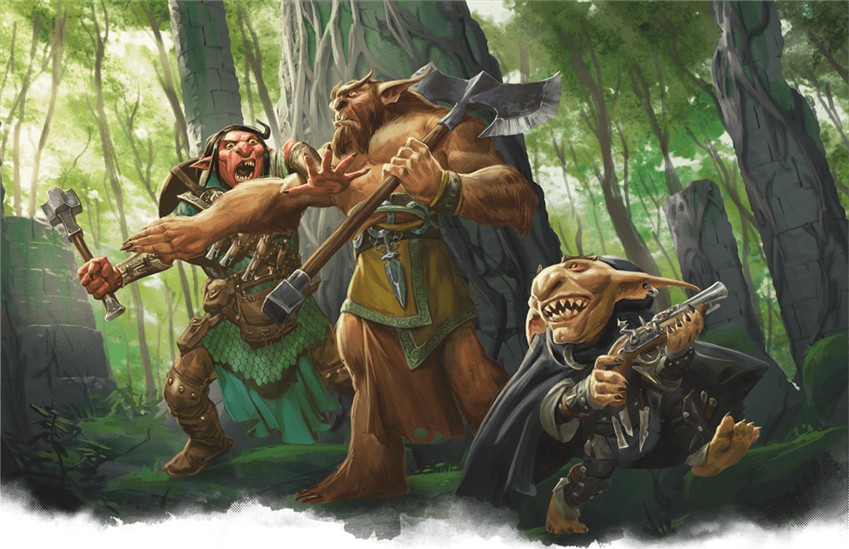
For Players: Good Habits for the Distinguished Gamer
There’s more to being a good tabletop gamer than just making strong characters or telling fun stories. While those two traits are undeniably important, the best gamers conduct themselves in a way that helps everyone enjoy the game. You don’t have to be a doormat or prioritize other people’s enjoyment over your own, and it doesn’t even mean staying out of the roleplaying spotlight or downplaying your own importance. Being an excellent D&D player means having as much fun as possible while still giving your fellow players (and your DM!) time to shine. Here are some ways that you can amp up the energy of your D&D group.
Think of Exciting Actions
It almost goes without saying, but your character’s actions are the one thing you have near-complete control over in D&D. What can you do, independent of anyone else, that will be fun for you? Do you like cinematic action-hero stunts? Do you like introspective moments of character-driven angst? Or do you prefer cracking jokes and making light of the situation at hand? Once you know what you like, think of how you can do this as much as you want.
Sometimes the right answer is to choose a class that lets you do this all the time. Bards are excellent for making jokester characters, fighters and monks are top-notch action heroes, and rogues and rangers make for silent, grim hunters and assassins. Read (or skim) chapter 3: Classes of the D&D Basic Rules to get a sense of what each class feels like, and choose the right tools for the job. If you’re doing cool stuff on the regular, your fellow players will surely try to do cool stuff with their characters too, creating a virtuous cycle of awesome moments in your D&D game.
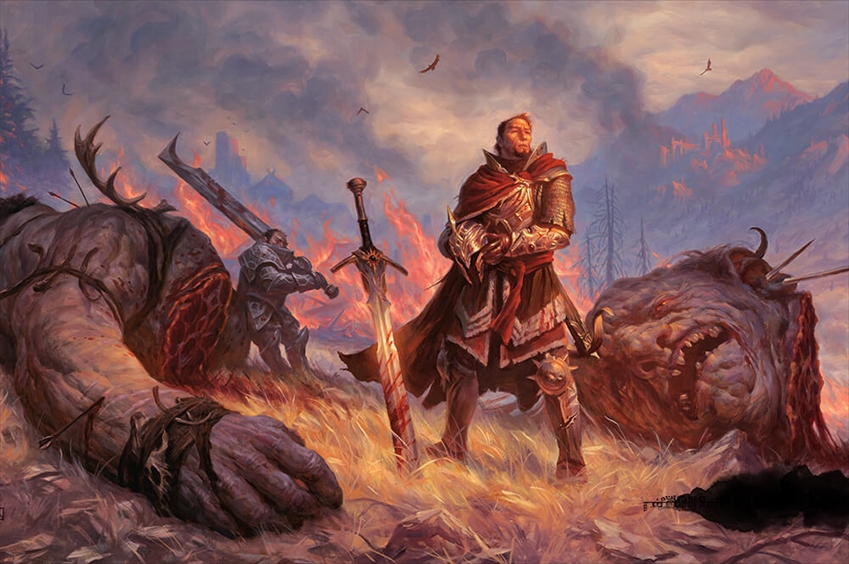
Get Hype for your Friends
On the other hand, doing cool stuff all the time is pretty tiring. It takes a lot of thought and planning to think of fun, cinematic moments, and you can risk getting stuck in your head and not living in the moment if you’re focused on thinking about what you’re going to do next. On the other hand, if you listen to what your friends are doing, you’ll find that they’re constantly doing fun stuff too. You’re their audience, and if you want people to care about what you’re doing when it’s your turn, you should give them the same attention you want from them.
The hardest part of doing this is staying present and not checking out the moment your turn ends. It’s easy to get sucked into your phone when it’s not your turn in D&D. Something interesting comes up on Twitter, or you get a text, or maybe a roleplaying scene has stressed you out and you need to disconnect for a few minutes. It’s totally okay to be on your phone during a D&D game, just don’t let it be the only thing that you do. Let yourself be entertained by your friends during the game, listen to their stories, and find ways to engage with them. This encourages them to give the same energy back to you, and it creates the same feedback loop that was mentioned in the last topic.
If you start to feel like you’re trying to engage with your friends but they don’t want to involve themselves in your story, or that your friends aren’t telling stories that interest you, it might be time to revisit Session Zero and set everyone’s expectations straight. Raise this concern with your DM if you want everyone in the group involved, or consider just talking with the friend you’re having problems with in private after the game. Communicating honestly with people is far and away the hardest part of D&D, but it’s the most important part of having a healthy D&D group.

Learn the Rules (And Use Your Knowledge for Good)
Knowing the rules of D&D is a good thing. When you choose a race, class, and background, read the rules thoroughly. It’s not totally necessary to know the full D&D rules to play, but it will help your game run more smoothly if you know all of the rules that pertain to your character. If you cast spells, it’s completely important to know how to cast them, otherwise the game will slow to a halt every time you try to use a core component of your class. Your DM will surely be able to help you with the rules, but they’re already juggling a dozen different NPCs, rules, and story elements already; it’s just good courtesy not to add to their workload.
The full rules are a lot of information to take in at once, especially if you’re new to D&D and don’t have any prior context to connect it to. Nevertheless, knowing how the game works is a vital step to enjoying the game for most people. If you’re not the kind of person who can encyclopedically learn information, try this method instead: skim the rules once or twice, and then make a note of each rule you forget or misremember while playing. It’s not a problem to have to fumble through the book for rules, but if you take a note, you can look back at the Basic Rules later to learn the rule completely.
If you do learn the rules, be careful not to wield them like a weapon against your fellow players—or worse still, your Dungeon Master. “Rules lawyers” use the letter of the rules to litigate their way out of conflict, abusing corner cases of the rules to be successful, even if it sucks the fun out of the game for everyone else. If you have a player at your table who’s making the game unpleasant by hanging on rules minutiae, this is another good time to request a second Session Zero. On the other hand, if you took the time to learn the rules of D&D backwards and forwards and feel like you’re restricting yourself because everyone else is playing fast and loose with the rules, that’s another good reason to gather a Session Zero and reevaluate everyone’s expectations regarding playing by the rules.
There are so many more ways you can be the best Dungeon Master or player ever, but this is a good start! Don’t try to do everything at once; even if you pick one aspect of this article to try and learn, you’re already well on your way to being a D&D master. Next time on New Player’s Guide, we go beyond the first session and learn how to develop your character into someone that can grow over the course of a campaign.
Create A Brand-New Adventurer Acquire New Powers and Adventures Browse All Your D&D Content
 James Haeck is the lead writer for D&D Beyond, the co-author of Waterdeep: Dragon Heist, Baldur's Gate: Descent into Avernus, and the Critical Role Explorer's Guide to Wildemount, a member of the Guild Adepts, and a freelance writer for Wizards of the Coast, the D&D Adventurers League, and other RPG companies. He lives in Seattle, Washington with his fiancée Hannah and their animal companions Mei and Marzipan. You can find him wasting time on Twitter at @jamesjhaeck.
James Haeck is the lead writer for D&D Beyond, the co-author of Waterdeep: Dragon Heist, Baldur's Gate: Descent into Avernus, and the Critical Role Explorer's Guide to Wildemount, a member of the Guild Adepts, and a freelance writer for Wizards of the Coast, the D&D Adventurers League, and other RPG companies. He lives in Seattle, Washington with his fiancée Hannah and their animal companions Mei and Marzipan. You can find him wasting time on Twitter at @jamesjhaeck.

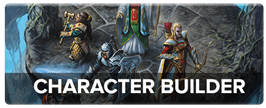
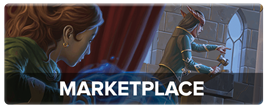
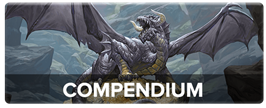
-
View User Profile
-
Send Message
Posted Feb 21, 2020Personally, I don't see "the New Player Guide link at the top of this page"... the link in the post takes me to the "How to find a D&D" group single article.
Where this article says it's the fourth (4th) in the series.
Where is the link to guide us to the entire series?
-
View User Profile
-
Send Message
Posted Feb 21, 2020My apologies for the mislinked URL. The link is now working as intended. In the future, you can search through the D&D Beyond article archives with ease by clicking on the TAGS at the bottom of any individual article. For example, this article is tagged "Dungeon Master Tips", "Player Tips", and "New Player's Guide". Clicking on any of those tags will show you all other articles that use that tag.
-
View User Profile
-
Send Message
Posted Feb 22, 2020Great article!
Always nice to have my role recognized. I've somehow gained an increasingly encylopedic knowledge of the rules in the 2 years I've played (mostly thanks to DDB and the ability to look stuff up in seconds ;) ), so I try to educate people on the rules where relevant - but naturally, I leave it to the DM to make the final judgment, and will abide by that as long as it's not making the game generally less fun for me or others. If their ruling does make the game less fun, of course, it's important to have a discussion with the DM and the group about that out of session.
-
View User Profile
-
Send Message
Posted Feb 22, 2020I think he was saying if you feel comfortable enough speaking about the things that make you uncomfortable. A lot of adults would have a hard time mentioning certain things that bother them.
-
View User Profile
-
Send Message
Posted Feb 22, 2020I am a DM on the younger side of things, with even younger players, are there any tips about when I am trying to correct one person about the rules/asking someone what their doing/making an ability check, and then the other people start talking, and when I finish, I quote ‘just 5 more mins, start talking without us’. HOW DO I STOP THIS!!!
-
View User Profile
-
Send Message
Posted Feb 22, 2020good job night before first campian
-
View User Profile
-
Send Message
Posted Feb 22, 2020James, are you watching my group?! We started out as a group of friends but life got in the way, and only one player of the old group remains, supplemented with new friends. Last Thursday, we had to pause the game because we never had a session zero (due to this gradual change) and we spoke through some of the things you bring up here. I think it's never too late to plan a session zero, and I also think it's one of the most necessary and most overlooked things that can prevent a game ending prematurely.
Thanks for this wonderful article, which I've immediately shared in my group!
-
View User Profile
-
Send Message
Posted Feb 22, 2020Can you help me join a campaign because I don’t know how
-
View User Profile
-
Send Message
Posted Feb 22, 2020Hi James!
Not meant as a critique, just an FYI: A word with less Internet baggage than "triggering" but equally valid with psychologists who work with PTSD patients is "activating."
-
View User Profile
-
Send Message
Posted Feb 22, 2020Thanks for letting me know! I hadn't heard of activating before. I used "psychologically triggering" in this article to specify that I'm using the legitimate meaning of the term, and not the one that's been corrupted by internet scumbags. I'm not sure that the synonymous meaning of "activating" is as clear to people outside of the psychological field, but I'll keep it in my back pocket. Thanks again.
-
View User Profile
-
Send Message
Posted Feb 22, 2020is that a goblin with a gun
-
View User Profile
-
Send Message
Posted Feb 24, 2020We've hosted multiple groups at our place for years, and we've learned a lot - most importantly making sure everyone is on the same page before they arrive. So now, we keep a Google doc "RPG Hosting - What to Expect" which covers both what players can expect (style of our game, house rules we use), things not allowed, and what we expect from them.
Every rule is there due to some negative experience in a game we've either hosted or been invited to that we'd rather not have a repeat of.
For example, the more important expectations we have of players:
The doc also cover my DMing/game style - a few minor house rules we use (group rolled stat arrays, minimum HP roll); that I use "fail forward" and "success with cost" for skill checks (i.e, if you roll, it's one-and-done - something is going to happen); that my NPCs are smart with a sense of self preservation; and there are consequences for ones actions. I even allow Evil characters if they are played smartly (no psychopaths).
-
View User Profile
-
Send Message
Posted Feb 24, 2020This is a really solid article. Thanks for the wonderful tips.
-
View User Profile
-
Send Message
Posted Feb 24, 2020"Learn the rules" I showed this to my PCs and they said that that is what I am for.
-
View User Profile
-
Send Message
Posted Feb 24, 2020When my players pull that crap I just don't tell them what they can do (class abilitiea). OFC now they are lvl 3 fighter, warlock, ranger, and sorcerer and all of them only ever melee attack things.
-
View User Profile
-
Send Message
Posted Feb 24, 2020I always take the position that it's their job to be the expert on their character and my job to clarify rules and keep things moving at the table.
-
View User Profile
-
Send Message
Posted Feb 24, 2020Harshly punish the players (in-game)
-
View User Profile
-
Send Message
Posted Feb 24, 2020That's the best approach I've seen. In game consequences for table behavior. There is a younger table at my main game shop, and this is how that DM keeps that from becoming utter chaos.
-
View User Profile
-
Send Message
Posted Feb 25, 2020Agreed. Players have a limited time in play to react when asked a question or presented with info by the GM. If they do not react, then things happen without them and they don't get the information they were after, or a target gets away, or an ambushing group of enemies gets a full set of turns while the players characters are distracted, etc. In actual combat, a character who ignores their turn coming up forfeits their turn. No 'You dodge by default', nothing. Just "You stand there looking confused." Keep their AC, passive stats and saves on record so you can have enemies attack them and know if they get hit or not. Make consequences stick. If the NPC with the crucial info gets ignored, then that info is gone and the game continues on without it. (Just make sure you haven't designed your adventures with single points of failure aka 'pixel-*****ing')
If the players are just there for 'beer and pretzel night with dice' and you are there for 'running a deeply engaging game' then that's a Session Zero topic to revisit. That might be a disconnect between your expectations and theirs. In the game-mastering book 'Arbiter of Worlds' Alexander Macris says to treat your campaign more like organizing an intramural sports league than like a hangout session. If you gathered to play rugby or something, you'd be expected to actually play and not stand around chatting and goofing off once the scrum begins. Treat Dungeons and Dragons the same. Eyes on the ball, and focus. Respect everyone's time. Get in there and hustle, Show some spizzerinctum and hucklety-buck. If that's the attitude you take, your games will be a lot more fun and engaging for everyone.
-
View User Profile
-
Send Message
Posted Feb 25, 2020thank you for this, i will always make healing magic hard to find (they don't know the importance of a cleric) and have monsters always jump the 1st level one (they did a bit of grinding on the first session, of which one player was absent) mwahahahaha!!!